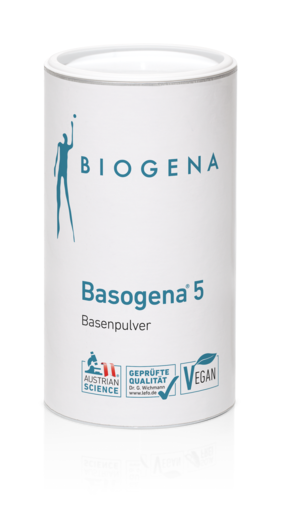Metabolism
Our health is directly linked to our metabolic processes. It is about which food components can be utilized as energy by the body. It is also about eliminating unutilizable metabolic end products from the body in various ways.



What is metabolism and are there multiple types of metabolism?
What do you think of first when you hear the term metabolism? The first thing you think of may be that your metabolism seems too slow and that you are therefore gaining weight more easily. You may also think about metabolic problems because you have digestive problems. In fact, various metabolic processes are constantly being carried out in the human body.
Perhaps you, like many people, primarily associate metabolism with your digestion. However, these processes are not the same.
It is more correct to say that the metabolism is dependent on digestion. In other words, digestion is the essential prerequisite for your metabolism. This is easy to understand when you look at the various processes in the stomach and intestine:
The stomach and intestines are the places in our body where nutrients are broken down into their components. Complex macronutrients such as carbohydrates are converted into simple sugars, proteins into amino acids, and fats into fatty acids, for example. The background for these conversion processes is that the intestinal nutrients can only be absorbed in a broken-down form. They can then reach the blood from the intestine in the broken-down form. Here they are transported further, for example to various organs such as the liver.
When we speak of metabolism in general, we mean all the processes that contribute to the utilization of degradation products and food elements. There are different types of metabolism based on the food components. For example, there are:
-
a carbohydrate metabolism
-
a protein metabolism
-
a fat metabolism
Experts also subdivide these into a mineral metabolism.
The metabolism is dependent on digestion. In other words, digestion is the essential prerequisite for your metabolism.
The anabolic and catabolic metabolism
The metabolism can also be categorised in a different way: Substances are built up or broken down by the metabolism and with the help of its metabolic functions.
Anabolism is the term used when substances are built up. The carbohydrate metabolism is, for example, a large part of the anabolic metabolism. Here, split individual substances that have reached the circulation and the cells from the food are converted into molecules from starch once again in the liver and in the muscle cells. These starch molecules are then stored. Anabolism is often talked about in connection with muscle building. This relates to the fact that proteins are built up into tissue through this.
Catabolism is the breakdown of metabolic products. Energy is produced from these degraded and decomposed metabolic components. Through metabolic functions, our body stores the individual nutrients in the different storage areas and organs (such as the liver). When energy is needed, the body uses the stored nutrients, splits them and consumes them. For example, starch stored in the liver can be converted into energy.
Metabolic disorders
As soon as the utilisation of different nutrients no longer works properly and a substance required by the body is no longer properly absorbed or does not arrive in the right place, this is called a metabolic disorder.
Food intolerances are partly metabolic disorders, because the absence of certain enzymes means that food components sometimes cannot be properly digested and absorbed. Disorders can occur in various parts of the metabolism, so lipid metabolism or mineral metabolism can also be impaired.
If metabolic disorders are considered more closely, it is noticeable that the various metabolic functions are dependent on the presence of other substances. For example, various enzymes are responsible for ensuring that food components such as fructose or milk sugar can be properly digested. If these enzymes are absent, digestive disorders occur and consequently also metabolic disorders. In diabetes, the hormone insulin is not produced by the pancreas in sufficient quantities or at all. This means that carbohydrates – carbohydrates are sugar – are no longer properly metabolised.
What does losing weight have to do with the metabolism?
You may also repeatedly hear and read in the papers that you simply need to boost your metabolism to lose weight. What kind of metabolism is involved here? In fact, the answer to this is not quite as easy as the question sounds. In addition to the substances mentioned for metabolic functions, there is also energy metabolism. This concerns how much energy we use. If you find calorie details listed on a food, this refers to the energy present in this food.
People have a certain basic turnover, that is, the energy they use when resting. In addition, there is also the turnover resulting from movement. If you want to lose weight, you have to use more energy than you absorb. The body must therefore be forced to use existing storage systems to use up this energy. Can the metabolism ever be boosted? Generally speaking your basic turnover cannot simply be increased or revved up, so to speak. More muscle mass has to be built up if you want to influence your basic turnover. More muscles represent a higher basic turnover. More exercise can increase your exercise turnover, for example, through sport. This can increase the demand for energy.
Boosting your metabolism: A higher metabolic rate (or basic turnover) can be achieved by building up more muscle mass. Muscles use energy at rest.
Food and its influence on metabolism
Fruit such as mango or papaya contains enzymes that strengthen the digestive function and contribute to better energy burning. Green tea or coffee are also thought to involve increased heat generation, which is said to lead to more energy consumption.
Nutritional scientists and doctors are currently still exploring the precise reasons for such possible effects. In laboratory experiments, there are indications that certain plant extracts or certain isolated ingredients from foodstuffs in high concentrations can positively influence fat burning.
As a rule, a metabolic change in the human organism can be achieved by a combination of different factors. As described, more muscles ensure an increased basic turnover and thus greater energy consumption. Muscles need exercise, i.e. a stimulus, as well as protein as a building material to grow. If the body has sufficient amino acids available, this can have a positive effect on muscle growth when movement is involved.
The metabolism is not just digestion
Since the metabolism goes beyond the mere absorption of food components, the aspect of detoxification is also very important for the metabolism, for example. Various plant substances and food components can be used to support the metabolism in its detoxification function. This aspect also plays a role in efforts to lose weight, for example.
If you move more because you do more exercise, more substances are released in the body that have to be excreted. Here, the liver, kidneys and skin play a major part. Thus, sufficient fluid intake also acts on the metabolism in general. In addition, various herbal extracts can support the liver and kidneys in their work.
All metabolic processes are important for our survival and well-being. If you want to support your metabolism, you can start with your digestive function. Particularly when it comes to losing weight, the focus falls on individual metabolic functions such as fat metabolism, for example.










